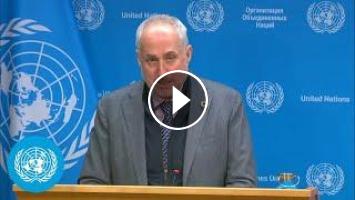Noon briefing by Stéphane Dujarric, Spokesperson for the Secretary-General.
Highlights:
-Islamophobia
-Haiti
-Gaza
-Occupied Palestinian territory
-Lebanon
-Syria
-Sudan
-Ukraine
-Security Council
-Colombia
-Nigeria
-Central Mediterranean/Shipwreck
-Financial contributions
-Noon briefing guest
ISLAMOPHOBIA
The Secretary-General delivered remarks at the International day to combat Islamophobia. He said as we gather today, muslims around the world observe the holy month of ramadan, but for many it is a moment to come together, uplift each other, but for many muslims around the world, these are times of anguish and fear. In the spirit of ramadan, he reiterated his call to silence the guns in Gaza and Sudan and he called for political, religious and community leaders everywhere to join his plea.
We also released a message on behalf of the Secretary-General, on the International Day to Combat Islamophobia. And on this day, he pointed out that this Day occurs at a time when we see a rising tide of anti-Muslim hate and bigotry in many parts of the world [inaudible] plague of islamophobia, he said. He underscored that leaders must condemn inflammatory discourse and safeguard religious freedom.
HAITI
In Haiti, the Office for the Coordination for Humanitarian Affairs say that the security situation in the capital Port-au-Prince remains tense and volatile, with each day of violence bringing more suffering to Haitians.
In a new survey, the World Food Programme found that recent events have degraded food security even further. People with the lowest levels of food consumption surged from 32 per cent to 41 per cent, according to the survey. More than two in three households saw their incomes drop, and seven in ten departments in Haiti reported that the price of food is increasing.
For its part, the UN Children’s Fund [UNICEF] says that hunger and life-threatening malnutrition are at record levels across the country, and concentrated in the capital city -Port-au-Prince- poorest, most insecure and congested neighbourhoods. More and more parents can no longer provide appropriate care and nutrition for their children. They also cannot take their children to health care centres due to the surrounding violence. Nearly one in four children in Haiti suffers from chronic malnutrition, also known as stunting.
The number of newly displaced people stands at 15,000 in Port-au-Prince, but it bears repeating that these families had already been displaced before, in some cases multiple times. Our humanitarian colleagues tell us that people are exhausted and distressed.
We and our national partners continue to work around the clock, despite the risks to reach people in need. Yesterday, the World Food Programme distributed some 14,000 hot meals to displaced people in Port-au-Prince. They also distributed food rations to 3,500 people in Cité Soleil.
GAZA
Turning to Gaza, the Under-Secretary-General for Humanitarian Affairs, Martin Griffiths, said that news of the reported killing yesterday of 20 people and injury of 155 others while waiting for aid at the entrance to Gaza City was shocking. Mr. Griffiths said these incidents cannot be allowed to continue – and people should not have to die while trying to keep their families alive.
Mr. Griffiths said distributing aid in Gaza should be done in a safe, dignified and predictable manner, adding that anything else is unconscionable. He also reiterated his call for an end to the conflict.
We and our humanitarian partners continue to deliver life-saving assistance to people in Gaza, wherever and whenever possible.
On Wednesday, the World Health Organization (WHO) and partners reached Al Aqsa hospital in Gaza’s Middle Area, delivering medical supplies for some 80,000 patients. Dr. Tedros Adhanom Ghebreyesus, the Executive Director of WHO said two of the hospital's warehouses are no longer functioning, and they are being used to shelter about 7,000 displaced men, women and children.
Each day at Al Aqsa, 140 health workers – nearly three-quarters of whom are volunteers –serve some 650 hospitalized patients, on top of the roughly 250 patients who are crammed in the emergency room. Dr. Tedros described the conditions in which people in Gaza are living and receiving health care as “inhumane.”
Full highlights: https://www.un.org/sg/en/content/noon-briefing-highlight?date%5Bvalue%5D%5Bdate%5D=15%20March%202024
Highlights:
-Islamophobia
-Haiti
-Gaza
-Occupied Palestinian territory
-Lebanon
-Syria
-Sudan
-Ukraine
-Security Council
-Colombia
-Nigeria
-Central Mediterranean/Shipwreck
-Financial contributions
-Noon briefing guest
ISLAMOPHOBIA
The Secretary-General delivered remarks at the International day to combat Islamophobia. He said as we gather today, muslims around the world observe the holy month of ramadan, but for many it is a moment to come together, uplift each other, but for many muslims around the world, these are times of anguish and fear. In the spirit of ramadan, he reiterated his call to silence the guns in Gaza and Sudan and he called for political, religious and community leaders everywhere to join his plea.
We also released a message on behalf of the Secretary-General, on the International Day to Combat Islamophobia. And on this day, he pointed out that this Day occurs at a time when we see a rising tide of anti-Muslim hate and bigotry in many parts of the world [inaudible] plague of islamophobia, he said. He underscored that leaders must condemn inflammatory discourse and safeguard religious freedom.
HAITI
In Haiti, the Office for the Coordination for Humanitarian Affairs say that the security situation in the capital Port-au-Prince remains tense and volatile, with each day of violence bringing more suffering to Haitians.
In a new survey, the World Food Programme found that recent events have degraded food security even further. People with the lowest levels of food consumption surged from 32 per cent to 41 per cent, according to the survey. More than two in three households saw their incomes drop, and seven in ten departments in Haiti reported that the price of food is increasing.
For its part, the UN Children’s Fund [UNICEF] says that hunger and life-threatening malnutrition are at record levels across the country, and concentrated in the capital city -Port-au-Prince- poorest, most insecure and congested neighbourhoods. More and more parents can no longer provide appropriate care and nutrition for their children. They also cannot take their children to health care centres due to the surrounding violence. Nearly one in four children in Haiti suffers from chronic malnutrition, also known as stunting.
The number of newly displaced people stands at 15,000 in Port-au-Prince, but it bears repeating that these families had already been displaced before, in some cases multiple times. Our humanitarian colleagues tell us that people are exhausted and distressed.
We and our national partners continue to work around the clock, despite the risks to reach people in need. Yesterday, the World Food Programme distributed some 14,000 hot meals to displaced people in Port-au-Prince. They also distributed food rations to 3,500 people in Cité Soleil.
GAZA
Turning to Gaza, the Under-Secretary-General for Humanitarian Affairs, Martin Griffiths, said that news of the reported killing yesterday of 20 people and injury of 155 others while waiting for aid at the entrance to Gaza City was shocking. Mr. Griffiths said these incidents cannot be allowed to continue – and people should not have to die while trying to keep their families alive.
Mr. Griffiths said distributing aid in Gaza should be done in a safe, dignified and predictable manner, adding that anything else is unconscionable. He also reiterated his call for an end to the conflict.
We and our humanitarian partners continue to deliver life-saving assistance to people in Gaza, wherever and whenever possible.
On Wednesday, the World Health Organization (WHO) and partners reached Al Aqsa hospital in Gaza’s Middle Area, delivering medical supplies for some 80,000 patients. Dr. Tedros Adhanom Ghebreyesus, the Executive Director of WHO said two of the hospital's warehouses are no longer functioning, and they are being used to shelter about 7,000 displaced men, women and children.
Each day at Al Aqsa, 140 health workers – nearly three-quarters of whom are volunteers –serve some 650 hospitalized patients, on top of the roughly 250 patients who are crammed in the emergency room. Dr. Tedros described the conditions in which people in Gaza are living and receiving health care as “inhumane.”
Full highlights: https://www.un.org/sg/en/content/noon-briefing-highlight?date%5Bvalue%5D%5Bdate%5D=15%20March%202024
- Category
- United Nations
- Tags
- UN, United Nations, UNGA
Be the first to comment













